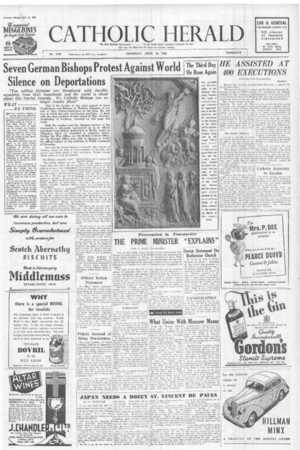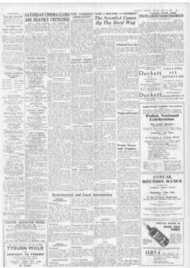Page 1, 18th April 1946
Page 1

Report an error
Noticed an error on this page?If you've noticed an error in this article please click here to report it.
Tags
Share
Related articles
"indian Christians Need Have No Qualms"
Christianity And Communism Contend For Reform
Papal Nuncio To India
They All Waited For Three-quarters-ofan-hour At Victoria
Was Lutyens Greater Than Wren?
THE PRIME MINISTER "EXPLAINS"
From a Special Correspondent.
Now in New Delhi, taking his part in the constitutional talks between the three members of the British Cabinet and representatives of the Indian Chamber of Princes, Sir Ramaswami Aiyar, Prime Minister of Travancore, explained in an exclusive interview last week why he has embarked on an educational policy which is stirring the indignation of Catholics not only in Travancore but throughout the country.
"The basis of my plans for a scheme of education which will be free, compulsory and neutral
is justice," said the Prime Minister. "It is seldom realised that there are fully 47 Christian sects in Travancore State, forming nearly one-third of the total population of six-and a-half millions. " Admittedly Catholics are the strongest and best organised group, and possess the greater percentage of schools and establishments. But the hulk of the populace is Hindu—and among Hindus there is no generally accepted code of belief to permit the encouragement of a specifically Hindu education in Hindu schools."
VICTIMISATION
" But if Catholics can and do claim their own accepted code of belief is there not something to be said for their assertion that they are being victimised?" 1 asked.
"On the contrary," said the Dcwan. " If the new decrees are not carricd into effect the majority of Travancore citizens will be the victims of discrimination in favour of the Catholic minority. Justice demands equal treatment for all."
Sir Ramaswami went on to deplore the recalcitrance of Catholics who, as opposed to other non-Catholic sects— he mentioned the London Mission, the American Mission and the Church of England—insisted on rejecting all com promise. " They demand Catholic schools in order to preserve what they choose to call the Catholic atmosphere.' The time has conic when the preservation of that atmosphere at the expense of a broader State-directed plan which will bring education to everyone, must cease to be a burden on the taxpayer."
" Why have you chosen this particular rime?" I queried.
"Because we are a progressive State and wish to inaugurate a policy of universal education without delay. I repeat that the most strenuous reaction has been confined to Catholics, but there is nothing sinister behind our move. If the people are to be cdu cated, education must be compulsory. If education is to be compulsory in a non-Christian State like Travancore it must he universal. There can be no part-monopoly for Catholics—otherwise we shall be powerless to prevent Hindus, for example, from undermining the new system by refusing to allow their children to attend Catholic schools."
"Is the door closed to negotiations. then?" I asked.
" Most certainly not. We arc willing to come to an agreement with Catholics. We are willing to giant State-aid so that they may build their own schools. But I will stand firm against all attempts at coercion by engineering
blog comments powered by Disqus







